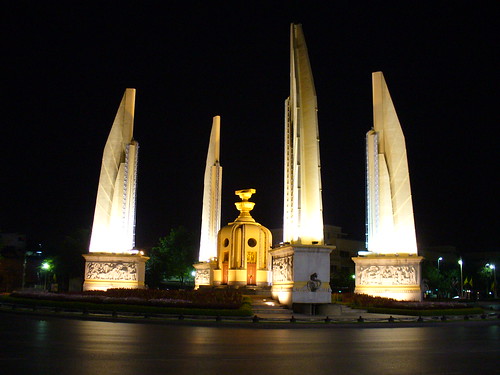
BANGKOK – From Thailand to Turkey to Ukraine, the relationship between ruling majorities and electoral minorities has become combustible – and is threatening to erode the legitimacy of democracy itself. The unfolding crisis in Bangkok – where a political minority has taken to the streets to bring down Prime Minister Yingluck Shinawatra’s democratically elected government – is a case in point.
Yingluck’s Pheu Thai Party (PTP) won an outright majority in Thailand’s 2011 general election, gaining 265 MPs in the 500-member lower house. But the opposition Democratic Party – which returned 159 MPs, mainly from Bangkok and southern Thailand – has lately been staging protests in the capital. The so-called “People’s Committee for Democratic Reform” – led by former Democratic Party MP Suthep Thaugsuban and supported by the Bangkok-based establishment – has effectively attempted to stage a coup.
The protests began when the government tried to enact amnesty legislation that would have overturned the conviction of former Prime Minister Thaksin Shinawatra – Yingluck’s brother and the PTP’s founder, who was overthrown by the military in 2006 – on charges of corruption and abuse of power. (It also would have superseded the murder charges brought against the Democratic Party’s leader, former Prime Minister Abhisit Vejjajiva.) But Yingluck’s subsequent attempt to backtrack on the amnesty measure failed to mollify the opposition.
In fact, the street protests intensified, fueled by a new grievance. The Yingluck government had refused to accept the Constitutional Court’s ruling against a bill to change the senate from a half-appointed to a fully elected chamber. The government asserted that the court did not have jurisdiction over constitutional amendments. The People’s Committee viewed this rejection as an attempt to pressure the king into countersigning the law – and thus as a threat to royal prerogatives and the king’s exalted role in Thailand.
The People’s Committee’s position deserves explanation, if not agreement. Since the turn of the century, Thaksin’s party machines, powered by his populist policies, have overcome constant challenges – from both the military and the Constitutional Court – to beat the conservative-royalist Democrats in every election.
Opposition forces, fed up as much with Thaksin’s corrupt practices as with his longstanding popularity, have recently begun seizing government ministries and calling for a royally appointed government. If they succeed, PTP supporters will likely descend on Bangkok, much as they did in 2009-2010, after a “judicial coup” dissolved Thaksin’s People’s Power Party, the PTP’s predecessor, and the Democrats formed a coalition government. But, this time, the protesters will be even angrier, and the stakes will be much higher, because the monarchy’s role in Thailand’s electoral democracy will be called into question.
The mere plausibility of such an outcome underscores Thailand’s deep political polarization. The PTP’s supporters are happy with a system that grants them a political voice – indeed, predictable electoral majorities – and that safeguards their rights. But the minority – which comprises up to two-fifths of the electorate – is at a loss. Its legitimacy and influence depend not on winning electoral majorities, but on its strong alliances with the military, bureaucracy, and judiciary in defense of a traditional hierarchy that places the king at its apex.
Making matters worse, voters on both sides are tuning in only to views with which they agree, rather than attempting to understand and reconcile opposing arguments. Social media – the much-lauded catalyst of democratization in authoritarian countries – has exacerbated the trend toward polarization in Thailand, just as it has in other electoral democracies that are struggling with a widening majority-minority divide, like Turkey and Malaysia.
In emerging democracies, electoral minorities tend to be tied to the old establishment, and often oppose change led by popular upstarts. Feeling marginalized and resentful, they may turn to public platforms like social media and the streets to advance their causes and undermine their opponents’ authority.
The proliferation of information technology, together with the unprecedented popular participation that it has fueled, means that electoral minorities have a growing number of increasingly powerful tools at their disposal to organize movements aimed at paralyzing their countries’ governments and even shortening leaders’ terms in office. Indeed, with so much seemingly at stake, a four- or five-year term may seem too long to wait for change.
But, while the right to peaceful protest is critically important in a democracy, electoral minorities should not use endless demonstrations to take the political system hostage. In order to create a peaceful, stable, and effective democratic system, electoral minorities must accept the ballot box as the arbiter of political legitimacy.
At the same time, majorities should not view an electoral victory as a license to act without regard for minority concerns. While the government must deliver for its constituents, it must also protect its opponents’ rights. To this end, Thailand urgently needs a new social contract that allows elected representatives to do their jobs, without marginalizing the establishment-based minority.
Increasingly complex majority-minority dynamics are shaping the democratization prospects of a number of countries, and could influence democracy’s durability as a system of government. Thailand’s experience suggests that efforts to subvert the system by thwarting the will of the majority may ultimately be fruitless, though not before imposing extremely high costs on everyone.
Thitinan Pongsudhirak is Professor and Director of the Institute of Security and International Studies at Chulalongkorn University’s Faculty of Political Science in Bangkok.
For additional reading on this topic please see:
Thailand: The Evolving Conflict in the South
Obama in Thailand: Charting a New Course for the Alliance?
Thailand: Contested Politics and Democracy
For more information on issues and events that shape our world please visit the ISN’s Weekly Dossiers and Security Watch.

